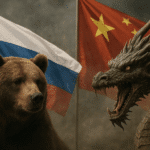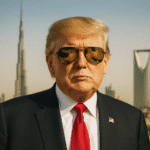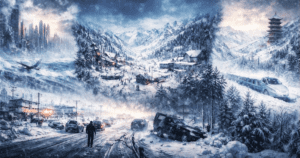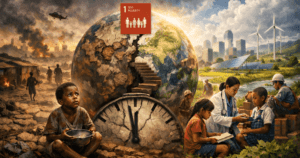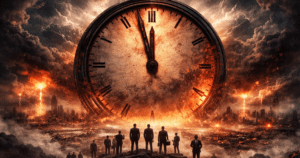The 80th anniversary of the end of World War II in Europe—known as Victory in Europe (VE) Day—was marked on May 8, 2025. This commemorates the date in 1945 when Nazi Germany officially surrendered to the Allied forces, ending the war in Europe. Across Europe, nations came together to mark the end of World War II, a conflict that claimed over 70 million lives and reshaped the geopolitical landscape of the 20th century. With memorial services, historical exhibitions, and public reflections, the continent honored the sacrifices made and the peace that has followed in the decades since.
United Kingdom: Royal Family Leads National Tribute
In London, the British royal family led commemorative events marking Victory in Europe (VE) Day. A solemn Service of Thanksgiving was held at Westminster Abbey, attended by King Charles III, Queen Camilla, Prince William, and Princess Catherine. This year’s service carried added weight as it was the first major VE Day commemoration without Queen Elizabeth II, who served in the war as a young princess and had been a symbol of Britain’s wartime resilience.
A national two-minute silence was observed to honor the 450,000 British and Commonwealth soldiers who lost their lives. Prime Minister Keir Starmer and Winston Churchill’s great-grandson also participated in the service. Outside, the Union Jack flew at half-mast, and veterans in full uniform laid wreaths at the Cenotaph.
Over the week, London also hosted a military procession, a Spitfire flypast over Buckingham Palace, and public concerts themed around 1940s music. Poppy installations were unveiled at the Tower of London, and public readings of wartime letters were broadcast across BBC radio and television. Queen Camilla’s statement urged citizens to “never forget the cost of freedom and the courage of those who fought tyranny.”
Germany: From Guilt to Vigilance – A National Reflection
In Germany, May 8 was declared a public holiday in Berlin, and a series of remembrance activities were held across the country. President Frank-Walter Steinmeier delivered a televised address in which he acknowledged Germany’s responsibility for the war’s devastation and the Holocaust. He warned of the dangers of forgetting or distorting history.
“Today, we honor the millions who died at our hands, and we also recommit ourselves to the peace that has been so hard won,” said Steinmeier. “We see the rise of revisionist narratives and extremism once again in Europe. This is a time to be vigilant, not complacent.”
The Museum Berlin-Karlshorst, the site where German forces officially surrendered in 1945, hosted a full-day exhibition and academic panels. A new photography exhibition, “The Last Year of the War,” highlighted civilian suffering and destruction in the war’s final months.
Elsewhere in Germany, memorials such as the Dachau and Neuengamme concentration camp sites hosted survivor talks, wreath-laying ceremonies, and youth-led discussions. In Hamburg, a poignant ceremony gathered descendants of Holocaust victims and war survivors to speak on peacebuilding across generations.
France and Poland: Remembering the Resistance and the Occupation
France held a national ceremony at the Arc de Triomphe in Paris, attended by President Emmanuel Macron and representatives of the French Resistance. The eternal flame was rekindled, and letters written by resistance fighters were read aloud.
In Poland, where the war began with the 1939 invasion, the Museum of the Second World War in Gdańsk unveiled new exhibits and hosted forums on memory politics. Polish leaders urged Europe not to forget the suffering of Eastern Europe, which bore the brunt of Nazi and Soviet occupations.
Russia: A Victory Day Amid War and Political Tension
In Moscow, the 80th anniversary of Nazi Germany’s defeat was commemorated with a grand military parade in Red Square on May 9. President Vladimir Putin used the occasion to draw historical parallels between WWII and Russia’s current military operations in Ukraine—a move criticized by Western leaders.
Putin was joined by Chinese President Xi Jinping and Brazilian President Luiz Inácio Lula da Silva, underscoring growing geopolitical realignments. The parade featured thousands of troops, tanks, and flyovers, but was overshadowed by reports of Ukrainian drone attacks on Russian infrastructure.
Critics accused the Kremlin of weaponizing the memory of WWII for contemporary political gains. Still, millions of Russians, many of whom lost family members in the “Great Patriotic War,” took to the streets in solemn marches carrying portraits of their ancestors.
Eastern Europe and the Baltics: Complex Legacies
In Ukraine, VE Day was observed not with large parades but with silent vigils and moments of remembrance for the estimated 8 million Ukrainians killed during WWII. Ukrainian President Volodymyr Zelenskyy stated, “Our country knows the price of peace and the wounds of war—and we are still fighting for our freedom today.”
The Baltic states—Latvia, Lithuania, and Estonia—held commemorative events highlighting the dual trauma of Nazi and Soviet occupations. Exhibitions in Vilnius and Riga emphasized personal stories of survival and resistance, including those of deported families and partisans.
Scotland: A Personal Touch
In Scotland, First Minister John Swinney attended a memorial service at Glasgow Cathedral. He gave a moving tribute to his uncle, a soldier who died in the conflict, and honored the 57,000 Scots who perished. Public events included a 1940s-themed veterans’ party and remembrance ceremonies at key train stations across the country.
A Shared Future
As Europe commemorated 80 years since the end of World War II, the events served as a powerful reminder of both the fragility and importance of peace. Across nations, leaders echoed a similar theme: the lessons of WWII must be remembered, especially in a time of rising populism, war, and historical revisionism. From war museums and graveyards to city squares and concert halls, Europe honored its past with an eye toward building a more just and united future.




